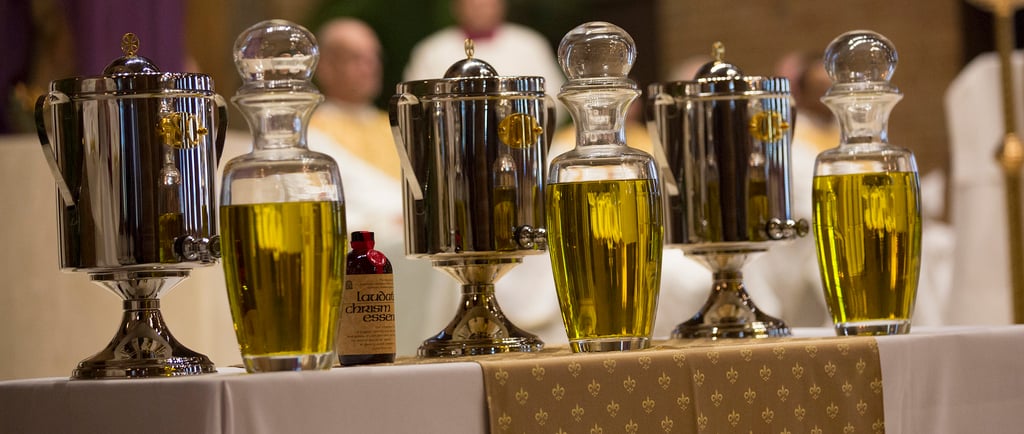Charism Mass Homily: Anointed to Serve
As you continue to grow in this mission of sanctifying service, know that these reflections point to a deeper exploration of how our liturgical celebrations infuse daily life with divine purpose. Therein lies further rich terrain in understanding how the living tradition of the Church, through its sacraments and the wisdom of its saints, calls us to be a light in the darkness—a topic that I challenge you all to continue contemplating amid the vibrant discourse found within the Holy Word of God.
HOMILIESHEALING


Gospel Reading: Luke 4:16-21
The Rejection of Jesus at Nazareth
16 When he came to Nazareth, where he had been brought up, he went to the synagogue on the sabbath day, as was his custom. He stood up to read, 17 and the scroll of the prophet Isaiah was given to him. He unrolled the scroll and found the place where it was written:
18 “The Spirit of the Lord is upon me,
because he has anointed me
to bring good news to the poor.
He has sent me to proclaim release to the captives
and recovery of sight to the blind,
to let the oppressed go free,
19 to proclaim the year of the Lord’s favour.”
20 And he rolled up the scroll, gave it back to the attendant, and sat down. The eyes of all in the synagogue were fixed on him. 21 Then he began to say to them, “Today this scripture has been fulfilled in your hearing.”
In the name of the Father, and of the Son, and of the Holy Spirit.
My dear brothers and sisters in Christ,
Today, as we gather on this Holy Thursday Charism Mass, we stand at a pivotal moment in our liturgical journey—a moment that carries us from the proclamation of God’s kingdom in Luke 4:16–21 to the unfolding mystery of the Eucharist at the Last Supper. In the synagogue at Nazareth, Jesus—filled with the Holy Spirit—declares, “The Spirit of the Lord is upon me,” announcing a mission of boundless mercy: to proclaim good news to the poor, freedom for the captives, recovery of sight for the blind, and liberation for those oppressed. In doing so, He not only reveals His divine mission but also invites each of us into a living encounter with the liberating love of God.
On this Holy Thursday, we are reminded that Jesus’ pronouncement was not simply an echo from the past but a continually unfolding promise. When our Lord proclaimed, “Today this scripture is fulfilled,” He beckoned us to perceive that the time for God’s favour and redemption is not a distant hope but a present reality. This reality finds its fullest expression in the Eucharist—instituted on the night of the Last Supper—where Jesus offered Himself as the Lamb of God. The Catechism of the Catholic Church teaches us that "the Eucharist is the source and summit of the Christian life" (CCC 1324), a truth that underlines the profound mystery of our faith and calls us to a deeper transformation in our daily lives.
Jesus’ ministry was one of radical service and humility. He did not seek power or worldly acclaim; instead, He chose the path of self-offering, tending to the needs of the marginalized and the broken. In our contemporary world, where injustice and despair often seem overwhelming, Christ’s example challenges us to become the hands and feet of His mercy. We are invited to engage in tangible acts of love that mirror His liberating work—by extending care to the poor, comforting the sorrowful, and speaking out against every form of oppression. As St. Augustine once wisely observed, “What does love look like? It has the hands to help others.” His words remind us that our faith must find expression in concrete deeds of compassion.
Some years ago, in one of our parishes, there was a dedicated sister known for her quiet yet profound commitment to serving others. On a chilly evening approaching Holy Thursday, she volunteered at a local shelter that had become a haven for the forgotten and the marginalised. During one visit, she met a man burdened by sorrow and isolation—one who had lost hope amid life’s many struggles. With a gentle smile and compassionate words, she invited him to join her for a simple, warm meal. As they sat together, the humble act of sharing food and heartfelt conversation transformed the man’s anguish into renewed hope. He later confessed that he felt, in that moment, the unmistakable presence of Christ—mirroring the liberating message proclaimed at Nazareth. Like a modern echo of those first sacred words, this encounter reminded all present that love in action brings the Kingdom of God into our midst.
Jesus chose a path defined not by worldly prestige but by compassion and service. St. Augustine once declared, “What does love look like? It has the hands to help others.” His words challenge us to mobilise our own hands and hearts, reaching out to heal the wounds of society—just as Christ did.
The Eucharistic celebration, rich with symbolism and grace, stands as a testament to this mission. Here, we are not merely recalling events of the past but are actively drawn into the mystery of Christ’s sacrificial love. St. John Chrysostom remarked, “The Eucharist is not an empty ritual but the source of life that nourishes our soul.” In receiving the Body and Blood of our Lord, we are united to His passion, death, and resurrection. This intimate union enables us to be transformed into living witnesses of hope and instruments of reconciliation in our everyday encounters. As we partake in this sacred meal, we are, in effect, called to become bearers of light and agents of transformation in a world that so urgently needs healing.
Reflecting further on our sacred call, let us consider the profound connection between the Word proclaimed in Nazareth and the mystery of the Eucharist. Just as our Saviour’s declaration heralded the arrival of God’s kingdom, the precious gift of the Eucharist serves as an invitation for us to live out that kingdom here and now. Pope John Paul II once stated, “The Eucharist is the sacrament of love, for it signifies that Christ is love and that he is present to us in a unique and tangible way.” This remarkable truth implores us to allow that love to overflow within our communities, transforming our relationships and society by breaking down walls of indifference and exclusion.
Our church’s teaching, grounded in centuries of theological reflection and ecclesial tradition, calls us to embody this liberating message in every aspect of our lives. St. Thomas Aquinas, a beacon of theological clarity, reminds us that the grace conferred in the sacraments is not an abstract gift but a transformative power meant to sanctify our everyday lives. By embracing the Eucharist, we not only commemorate Christ’s sacrificial act but also commit ourselves to a life of service, self-sacrifice, and humble charity. In living out this calling, we honour the sacred mystery of Holy Thursday and allow our faith to be a continual source of hope and consolation for those who suffer.
In our modern society, many feel trapped in cycles of despair and marginalisation. Yet, the message of liberation spoken by our Lord in Luke’s Gospel remains as relevant today as it was two thousand years ago. Whether through social outreach, advocacy for justice, or simple acts of kindness, we are each called to manifest the Gospel in our surroundings. As the Catechism emphasises, the Church is a "community of charity" where every member, invigorated by the Holy Spirit, is tasked with the mission of healing and uplifting those in need. This Holy Thursday, let our hearts be stirred and renewed by the invitation to follow in Jesus’ footsteps—a call that transcends time, culture, and circumstance.
My dear brethren, let us leave this Mass with hearts ignited by the spirit of service and a renewed determination to let the light of Christ shine through our actions. May the words “Today this scripture is fulfilled” resonate within us every day, reminding us that our mission is not postponed but is to be lived in every act of service and every moment of genuine compassion.
I invite you to reflect on how the sacred mysteries of Holy Week can transform not only your personal journey of faith but also your active witness in the world. Consider how the radical, liberating love of Christ can inspire you to be a bearer of hope, a helper of the hurting, and a constant reminder that God’s kingdom is established among us through small and tangible acts of sincere love.
As you continue to grow in this mission of sanctifying service, know that these reflections point to a deeper exploration of how our liturgical celebrations infuse daily life with divine purpose. Therein lies further rich terrain in understanding how the living tradition of the Church, through its sacraments and the wisdom of its saints, calls us to be a light in the darkness—a topic that I challenge you all to continue contemplating amid the vibrant discourse found within the Holy Word of God.
In the name of the Father, and of the Son, and of the Holy Spirit.
Amen.
Ancient Apostolic Catholic Church
Embracing faith, inclusion, and compassionate service together.
ST THOMAS AQUINAS SEMINARY
© 2025. All rights reserved
QUICK LINKS
